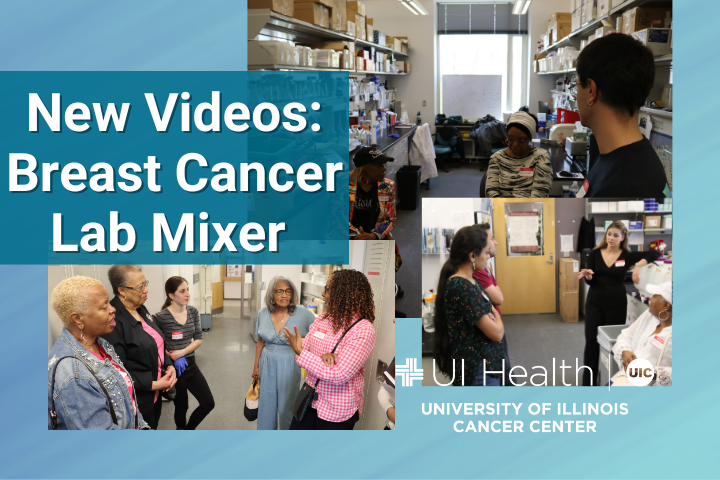
Two new videos in English and Spanish give you a closer look at the day when members of the Chicagoland chapter of the Sisters Network Inc., the nation’s largest African American breast cancer survivorship organization, met University of Illinois Cancer Center members to learn more about breast cancer research and tour their labs. It’s all part of a bidirectional sharing of information between community members and Cancer Center researchers to inform the work being done in labs and clinical trials.
Watch the Videos
Watch the videos and others at our YouTube channel.
Translating Scientific Discoveries
The goal of the Breast Cancer Lab Mixer was to demonstrate for the 14 breast cancer survivors how scientific discoveries in labs can translate to clinical trials of potential new treatments for cancer that can work for everyone and be accessible to everybody. Diversity among clinical trial participants is vital to this and, at the Cancer Center, 79% of clinical trial participants are African American or Latino.
During their lab tours, survivors learned what researchers see through a microscope and how those images are interpreted, and viewed cancer cells that were growing through a microscope.
Cancer Center member Ekrem Emrah Er, PhD, updated the women on what scientists are learning about breast cancer. Cancer Center member Abiola Ibraheem, MD, told the women more about breast cancer clinical trials, while Kelly Conger, PhD, from the lab of Cancer Center member Jonathan Coloff, PhD, talked about how community input impacts and guides that science, including asking for feedback on studies on serine, an important nutrient for cancer development and growth.
Breast Cancer Survivors Inform Science
Survivors were excited to give feedback – including advocating for experiments to test the impact of serine-free diets on tumor metabolism and studies that test the potential to eliminate transporters that carry serine and lead to cancer proliferation. They also shared with the scientists their stories and the challenges they faced when they were going through cancer treatments, all part of a bidirectional sharing of information between community members and Cancer Center researchers to inform the work being done in labs and clinical trials.
The event was organized by the Cancer Center’s Office of Community Engagement and Health Equity.
